FiBL Switzerland has at its disposal modern infrastructure that drives forward research in organic agriculture. The available facilities range from climate chambers and a parasitology laboratory to the DOK trial in Therwil, which has been running since 1978 and in which FiBL researchers compare organic, biodynamic and conventional farming methods in a large field research plot. This infrastructure allows for research to be conducted at the highest international level in the various fields that make up the (organic) agriculture sector and thus to gain important insights for practice.
Crop sciences applications laboratory
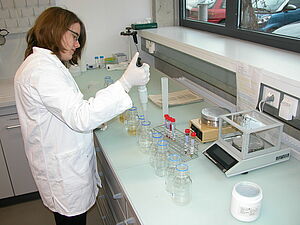
The work conducted at the crop sciences applications laboratory at FiBL in Frick includes evaluations of the effectiveness of organic crop protection products. Fungicides or resistance inducers can be tested here under controlled and standardised conditions in the following systems: grapevine and downy mildew, apple and scab, apple and Marssonina leaf blotch and tomato and late blight. Product tests for rainfastness and UV resistance are also possible.
Contact
Link
fibl.org: Crop sciences applications laboratory
DOK Experiment
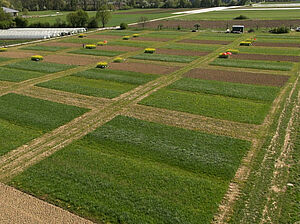
The DOK trial is a long-term experiment that compares biodynamic (D), organic (O) and conventional (K for German: "konventionell") cropping systems. It has been running since 1978 in Therwil near Basel. This long-term comparative trial has produced a great deal of globally recognised evidence of the ecological advantages of organic agriculture, which serves as reference for many national and international projects. The different farming methods are represented in a split-plot design. The trial is being conducted in close cooperation with Agroscope.
Contact
Link
fibl.org: DOK Experiment
FiBL’s research trial networks
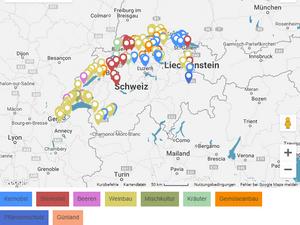
At FiBL, theory and practice are not mutually exclusive; quite to the contrary: FiBL Switzerland has been conducting research in cooperation with practitioners for more than 40 years. Research is carried out in trial networks in-situ, in partnership with commercial holdings, on their farms and in their fields.
Three interactive maps show the partner farms. In the area of arable farming, for example, cultivar trials and investigations into cultivation techniques – such as aspects of no-till direct seeding or intercropping – are carried out. In the area of livestock research, several hundred Swiss organic farms have already taken part in FiBL trials and studies in the fields of animal health, feeding, husbandry and breeding. The trial networks in the area of special crops currently include 130 farms, which are taking part in trials on vegetable, berry and herb production, among other enterprises.
Research within these networks has the great advantage that the most suitable farms or locations can be selected for each study. The participating farms can thus also actively influence research questions and have direct and immediate access to the research results. This ensures a close exchange between research and practice – an important factor in promoting bi-directional knowledge transfer and jointly advancing organic agriculture.
Contacts
- Mathias Christen and Matthias Klaiss (arable farming)
- Christophe Notz (livestock research)
- Anja Vieweger (special crops)
Link
fibl.org: The European Agroecology Living Lab and Research Infrastructure Network
FiBL trial networks related to livestock research
Load external content (Google Maps)
In order to open this external media content, you must first activate it.
When you activate this media content, your browser establishes a direct connection with the servers of the third-party provider. We would like to point out that after activation, data is transmitted to the third-party provider, and the provider may set cookies, which can also be used for analysis and marketing purposes. For more information, please refer to our privacy policy.
FiBL trial networks related to special crops
Load external content (Google Maps)
In order to open this external media content, you must first activate it.
When you activate this media content, your browser establishes a direct connection with the servers of the third-party provider. We would like to point out that after activation, data is transmitted to the third-party provider, and the provider may set cookies, which can also be used for analysis and marketing purposes. For more information, please refer to our privacy policy.
FiBL trial networks related to arable farming
Load external content (Google Maps)
In order to open this external media content, you must first activate it.
When you activate this media content, your browser establishes a direct connection with the servers of the third-party provider. We would like to point out that after activation, data is transmitted to the third-party provider, and the provider may set cookies, which can also be used for analysis and marketing purposes. For more information, please refer to our privacy policy.
R&D livestock housing unit
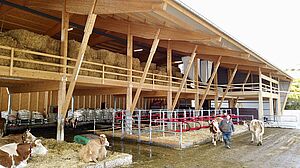
The modern R&D livestock housing unit is the centrepiece of the agricultural buildings inaugurated in 2020 at FiBL in Frick. It provides an ethologically sound home for tenant family’s "Swiss Fleckvieh" cattle. Moreover, a separate research compartment offers researchers from the Department of Livestock Sciences the opportunity to carry out on-site projects, of course in close collaboration with the tenant family.
Contact
Links
- youtube.com: Virtual tour of the livestock housing unit (German only)
- orgprints.org: New "dual-purpose barn" at FiBL (German only)
Outdoor laboratory
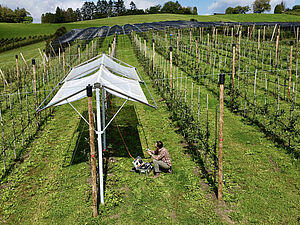
Crop protection is one of the major challenges in organic fruit production. Interventions with organic crop protection products are often required. Leaf diseases caused by fungi are particularly relevant in this context. These can occur when it rains and the leaves get wet. FiBL has established a trial plantation at the Frick site to test new approaches to reducing the frequency of treatments with crop pesticides.
This involves testing new growing techniques with mobile covers designed to keep the rain off. An intelligent cover that is controlled by sensors and IT systems, for example, is designed to keep the trees dry and thus prevent fungal diseases. The system draws on the weather forecast and automatically opens and closes the cover as needed. The covers are mobile, not static, so that the ecology, environmental interaction and landscape appeal are preserved during rain-free periods. A variety of systems are being tested and compared.
Furthermore, at this trial plantation the Guyot training system is being trialled in apples under organic conditions and compared with the classic spindle training system. Guyot training has already been used in commercial apple plantations in South Tyrol for several years. The central leader is guided horizontally, as in the Guyot vine training system, and the side branches are guided vertically upwards. This results in slender cordons of foliage and fruit and ideal sun exposure for the fruit. This training system thus also offers ideal conditions for mechanised pruning and possibly also mechanised harvesting in the future.
Contacts
Link
Frick trial
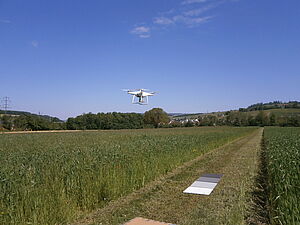
Since 2002 the Frick trial has been investigating the extent to which reduced tillage and different fertiliser treatments affect yields and soil fertility. This trial once again demonstrates FiBL’s great emphasis on research with practical applications: results of practical relevance to farmers are published not only in scientific journals but also in journals for practitioners.
Contact
Links
Greenhouse, climate rooms and climate chambers
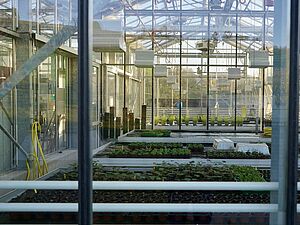
In the greenhouse in Frick, which was inaugurated in 2019, experimental research on plants is being conducted on 300 square metres, supporting i.a. research on crop protection and organic breeding of fruit, clovers, cotton, cereals and vegetables. Depending on space requirements, climatic conditions and control accuracy, experiments can be carried out either in self-contained climate cabinets, in climate chambers or in the greenhouse. In addition to experiments in the areas of plant nutrition and nutrient mineralisation, this space is used to grow a large variety of plants to be used in lab experiments.
There are five compartements in the greenhouse that can be controlled separately in terms of environmental conditions, as well as a spacious working area. In addition, a significant number of different climate rooms and climate chambers allow for the regulation of the requisite climate conditions in as precise a manner as possible, for temperature curve simulations and provision of different light qualities.
In addition to crop science experiments, specialised climate rooms are also used for experiments involving insects, allowing, for example, for research into insect-plant interactions as well as the experimental breeding of specific populations. This wide range of possibilities allows FiBL to conduct experiments under fully controlled conditions as well as under near real-life conditions and thus ensures high relevance in this research field.
Contact
Link
fibl.org: Media release on the inauguration of the greenhouse (in German)
Low-input orchard (BioDiVerger)
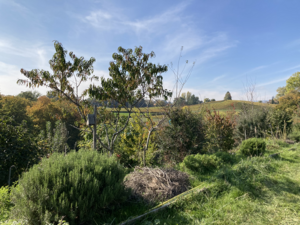
Organic orchards are often similar in concept to conventional ones. Frequently one finds a monoculture with little biodiversity. BioDiVerger is a project that emerged in Romandie in 2012 with a view to experimenting with an innovative orchard, the basic principles of which are rooted in permaculture and agroforestry, with a high degree of biodiversity and as an antithesis to common practice. The orchard is situated in Marcelin in the canton of Vaud.
Contacts
- Flore Araldi
- Hélène Bougouin
Links
- fibl.org: Project "Low-input orchard (BioDiVerger)" in the FiBL project database
- bioaktuell.ch: Article "Der Obstgarten als Permakultur – eine Utopie?" (in German)
Parasitology lab
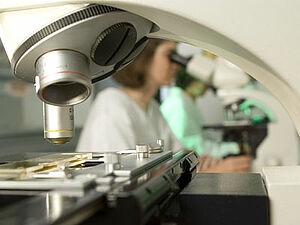
The parasitology laboratory offers diagnostics for different animal species - from routine examinations to research-related analyses. The laboratory primarily specialises in the analysis of faecal samples from various livestock species.
Contacts
Link
fibl.org: Laboratory of animal sciences
Trial plantations of stone fruit, pome fruit and berries
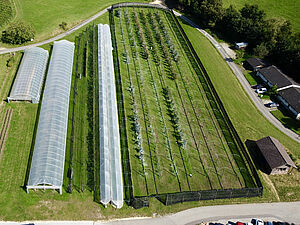
FiBL has various trial plantations of stone fruit, pome fruit and berries at its Frick site. The plantations are used to advance existing cultivation systems in organic fruit production. The aim is to improve production conditions in order to foster sustainability.
In addition to research on technical cultivation measures, such as direct and indirect plant protection, thinning or fertiliser use, new cultivars of apples, pears, apricots, cherries and berries are tested under organic conditions. The plants are tested in the field with respect to their cropping properties and fruit quality is also closely examined, with taste being a very important aspect. All this information is taken into account in the lists of recommended cultivars. In order to support the production of stone fruit, pome fruit and berries it is crucial that the knowledge thus generated is conveyed through various channels of communication.
Contact
Link
fibl.org: Group Fruit Production
FiBL winery
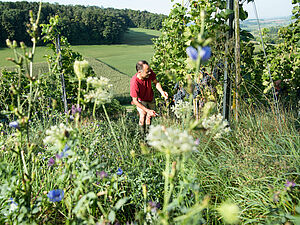
Since 2004 FiBL has been managing a vineyard at the Frick site in accordance with the strict Bio Suisse Standards. This gives FiBL the opportunity to constantly pick up on research findings which are implemented in the vineyard on a site-specific basis, and in the winery on a cultivar-specific basis. For example, certain wildflowers are sown to support specific insects, and purely plant-based crop pesticides against fungal diseases are developed together with FiBL researchers.
Moreover, the FiBL winery is constantly developing and testing new cultivars with resistance traits to fungal diseases, known as PiWi varieties, which do not require the use of copper as a crop pesticide. In the modern winery the FiBL team of vintners produces more than 40 different wines. Wine tastings can be arranged on request.
Contact
Link
weingut.fibl.org: Website of the FiBL vineyard (German only)




